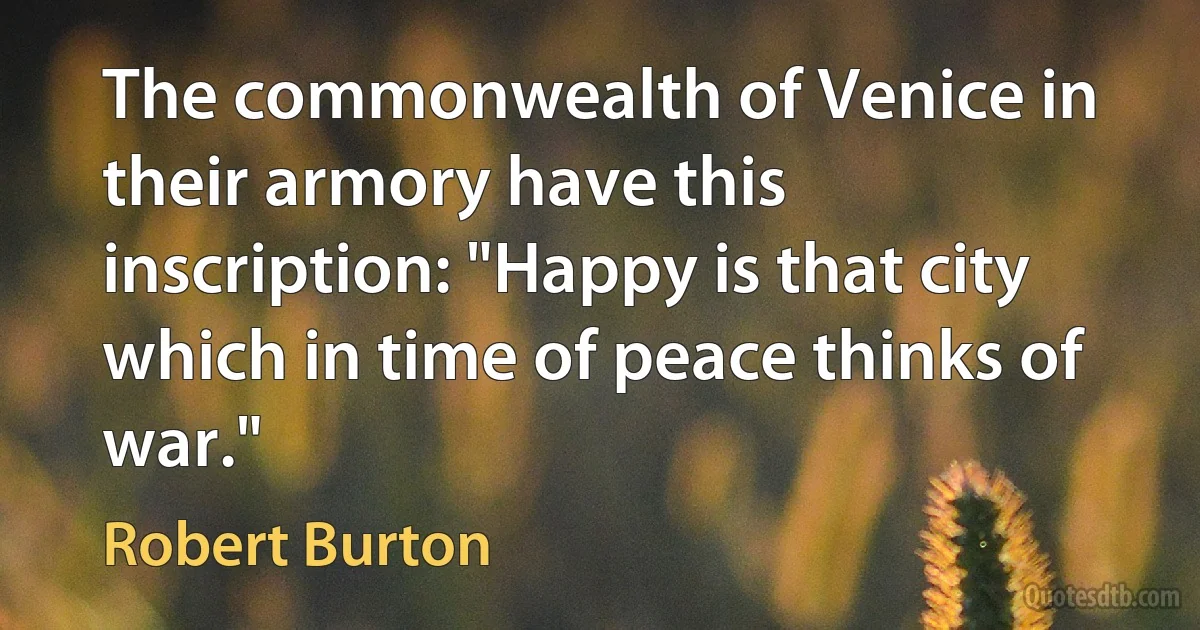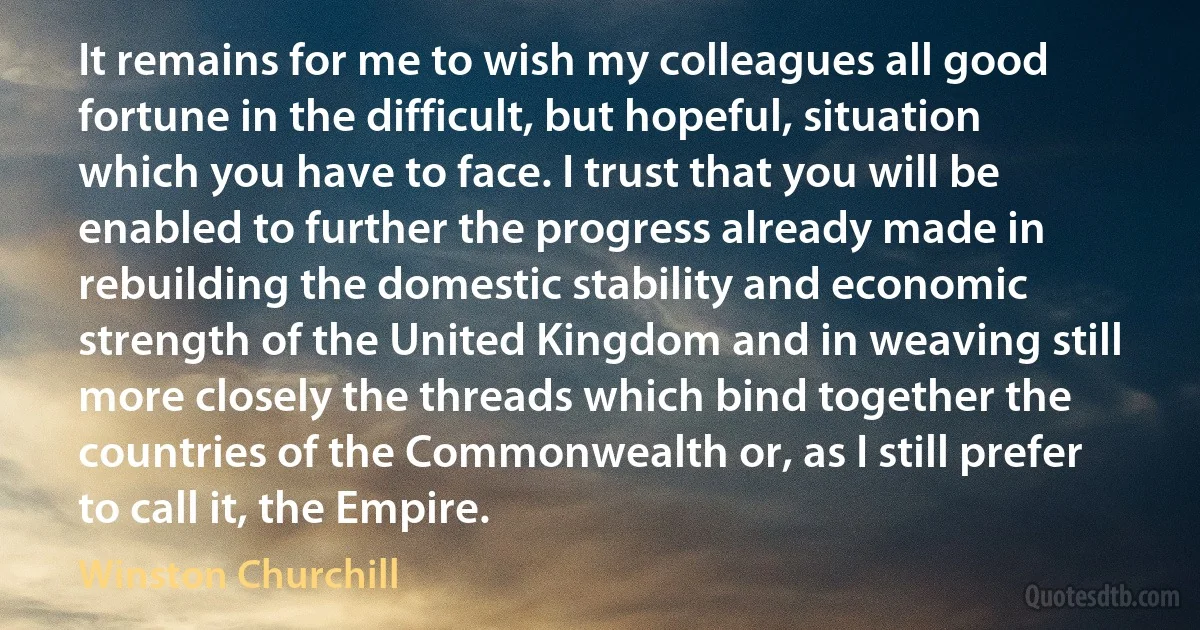Commonwealth Quotes - page 3
He (Gauis Gracchus) was a political incendiary. Not only was the hundred years' revolution which dates from him, so far as it was one man's work, the work of Gaius Gracchus, but he was above all the true founder of that terrible civic proletariat flattered and paid by the classes above it, which was through it aggregation in the capital - the natural consequence of the largesses of corn - at once utterly demoralized and made conscious of its power, and which - with its pretensions, sometimes stupid, sometimes knavish, and its talk of the sovereignty of the people - lay like an incubus for five hundred years upon the Roman commonwealth and only perished along with it. And yet again, this greatest of political transgressors was the regenerator of his country. There is scarce a fruitful idea in Roman monarchy, which is not traceable to Gaius Gracchus.

Theodor Mommsen
The true friend of property, the true conservative, is he who insists that property shall be the servant and not the master of the commonwealth; who insists that the creature of man's making shall be the servant and not the master of the man who made it. The citizens of the United States must effectively control the mighty commercial forces which they have called into being.

Theodore Roosevelt
A great democratic commonwealth should seek to produce and reward that individual distinction which results in the efficient performance of needed work, for such performance is of high value to the whole community. But hand in hand with this purpose must go the purpose which Abraham Lincoln designated as the "amelioration of mankind.” Only by an intelligent effort to realize this joint process of individual and social betterment can we keep our democracy sound.

Theodore Roosevelt
At many stages in the advance of humanity, this conflict between the men who possess more than they have earned and the men who have earned more than they possess is the central condition of progress. In our day it appears as the struggle of freemen to gain and hold the right of self-government as against the special interests, who twist the methods of free government into machinery for defeating the popular will. At every stage, and under all circumstances, the essence of the struggle is to equalize opportunity, destroy privilege, and give to the life and citizenship of every individual the highest possible value both to himself and to the commonwealth.

Theodore Roosevelt
We lost 2 great friends and patriots today. Berke and Jay will be greatly missed. TY for your service to VA.
We are deeply saddened by the loss of Jay and Berke, both of whom were our close friends and trusted members of our team. Jay has flown us across the commonwealth for more than three and a half years. Berke was devoted to our entire family as part of our Executive Protective Unit team for the past three years.
This is a devastating loss for their families, the Virginia State Police, and the entire commonwealth. Out hearts go out to their wives and children, and we stand by to support them during this difficult time. These heroes were a part of our family and we are simply heartbroken.

Terry McAuliffe
Of a commonwealth, whose subjects are but hindered by terror from taking arms, it should rather be said, that it is free from war, than that it has peace. For peace is not mere absence of war, but is a virtue that springs from force of character : for obedience is the constant will to execute what, by the general decree of the commonwealth, ought to be done. Besides, that commonwealth, whose peace depends on the sluggishness of its subjects, that are led about like sheep, to learn but slavery, may more properly be called a desert than a commonwealth.

Baruch Spinoza
While North Carolina has the honor of first authorizing its delegates to concur with other Colonies in declaring independence, it was quickly followed by South Carolina and Georgia, which also gave general instructions broad enough to include such action. But the first instructions which unconditionally directed its delegates to declare for independence came from the great Commonwealth of Virginia. These were immediately followed by Rhode Island and Massachusetts, while the other Colonies, with the exception of New York, soon adopted a like course.

Calvin Coolidge
To be a socialist means to let the ego serve the neighbour, to sacrifice the self for the whole. In its deepest sense socialism equals service. The individual refrains and the commonwealth demands.
Frederick the Great was a socialist on a king's throne.
"I'm the first servant of the state." A kingly socialist saying.
Property is theft – so says the mob. Each to his own – so says the personality.

Joseph Goebbels
Plato by a goodly similitude declareth, why wise men refrain to meddle in the commonwealth. For when they see the people swarm into the streets, and daily wet to the skin with rain, and yet cannot persuade them to go out of the rain, they do keep themselves within their houses, seeing they cannot remedy the folly of the people.

Thomas More
I wish more of us could understand that our increasing isolation, no matter how much it seems to express pride and self-affirmation, is not the answer to our problems. Rather, the answer is a revival of our ancient commitment to God, who rules over all the peoples of the world and exalts no one over any other, and to the moral and spiritual values which were once legendary in America. We must reach out our hand in friendship both to those who would befriend us and those who would be our enemy. We must believe in the power of education. We must respect just laws. We must love ourselves, our old and our young, our women as well as our men.
I see nothing inconsistent between being proud of oneself and one's ancestors and, at the same time, seeing oneself first and foremost a member of the commonwealth of all races and creeds.

Arthur Ashe
In considering our traditional ties with the Commonwealth we should remember that it now differs greatly from the entity which existed 20 or 30 years ago. Many of us do not feel quite the same allegiance to Archbishop Makarios or Doctor Nkrumah or to people like Jomo Kenyatta as we do towards Mr. Menzies of Australia.

Margaret Thatcher
We fought to show that aggression does not pay and that the robber cannot be allowed to get away with his swag. We fought with the support of so many throughout the world: the Security Council, the Commonwealth, the European Community, and the United States. Yet we also fought alone – for we fought for our own sovereign territory.

Margaret Thatcher
...to-morrow the proclamation of her sovereignty will command the loyalty of her native land and of all other parts of the British Commonwealth and Empire. I, whose youth was passed in the august, unchallenged and tranquil glories of the Victorian Era, may well feel a thrill in invoking, once more, the prayer and the Anthem, GOD SAVE THE QUEEN.

Winston Churchill
All wars are accordingly so many attempts (not in the intention of man, but in the intention of Nature) to establish new relations among states, and through the destruction or at least the dismemberment of all of them to create new political bodies, which, again, either internally or externally, cannot maintain themselves and which must thus suffer like revolutions; until finally, through the best possible civic constitution and common agreement and legislation in external affairs, a state is created which, like a civic commonwealth, can maintain itself automatically.

Immanuel Kant
Our system of production is in the nature of an orchestra. No one man, no one town, no one state, can be said any longer to be independent of the other; the whole people of the United States, every individual therein, is dependent and interdependent upon all the others. The nature of the machinery of production; the subdivision of labor, which aids cooperation and which cooperation fosters, and which is necessary to the plentifulnesss of production that civilization requires, compel a harmonious working together of all departments of labor, and thence complete the establishment of a central directing authority, of an orchestral director, so to speak, of the orchestra of the cooperative commonwealth.

Daniel De Leon
Socialism rejects the premises and the conclusions of anarchy upon the State and upon government. What socialism says is "Away with the economic system that alters the beneficent functions of the central direction authority from an aid to production into a means of oppression." And it proceeds to show that, when the instruments of production shall be owned no longer by the minority, but shall be restored to the Commonwealth; that when, as a results of this, no longer the minority or any portion of the people shall be in poverty and classes, class distinctions and class rule shall, as they necessarily must, have vanished, that then the central directing authority will lose all its repressive functions and is bound to reassume the functions it had in the old communities of our ancestors, become against a necessary aid, and assist in production.

Daniel De Leon



